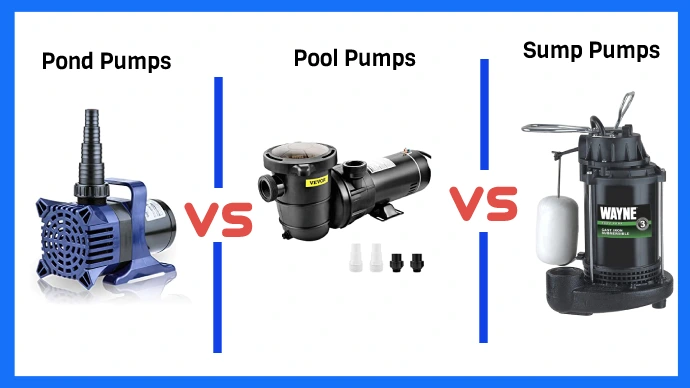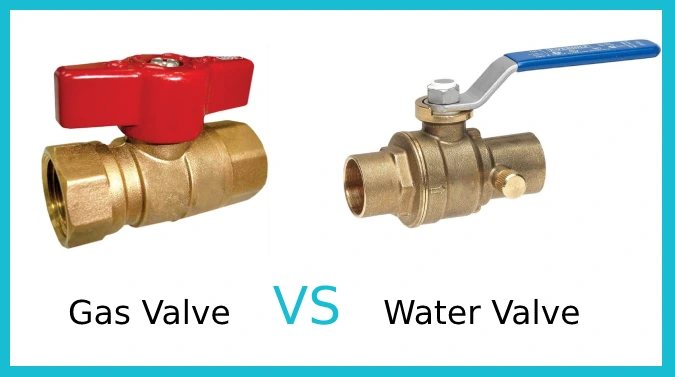Last Updated on April 30, 2023
Ponds, pools, and sumps all require pumps to keep them functioning properly. The difference between pond pumps, pool pumps, and sump pumps lies in the design of the pump, its power output, energy efficiency, and noise levels.
Pond pumps tend to be quieter and more efficient than pool and sump pumps, while sump pumps are typically much more powerful. Pool pumps are more environmentally friendly, while pond and sump pumps can be used on larger bodies of water with no issue.
Understanding the differences between each type of pump will save you time and money in the long run by helping you choose the right pump for your needs. Here, we will discuss the main differences between pond pumps vs pool pumps vs sump pumps as well as their benefits.
Comparing Pond Pumps Vs Pool Pumps Vs Sump Pumps: Know Their Main Differences

When considering the purchase of a pump, it is important to know what type of pump is appropriate for your application. The most common types of pumps are pond, pool, and sump pumps, each designed with different features and capabilities.
1: Designed for Use
Pond pumps are designed specifically for ponds or other outdoor water features. They are intended to move large amounts of water while helping keep it aerated and control algae growth. Pool pumps are used to recirculate water in pools and are suitable for indoor and outdoor use.
Sump pumps are vital for keeping basements and crawl spaces dry, their design allowing them to be installed either indoors or outdoors. Submersible and pedestal styles ensure the setup is always up to spec.
2: Flow Rate and Operating Pressure
Pond pumps typically have high flow rates but low pressure, whereas pool pumps operate at higher pressures at closer to 30m of the head but with lower flow rates. Similarly, sump pumps have lower flow rates than pond or pool pumps but operate at higher pressures, usually exceeding 5m of the head.
3: Run Time and Energy Efficiency
Pond pumps are designed to run continuously, 24/7. While this increases their overall operating costs, they tend to be more energy-efficient due to high flow rates and low head pressures.
Pool pumps require more energy due to their low flow rate and high head pressure. They are designed to run intermittently, resulting in higher overall operating costs.
Sump pumps require moderate energy input. Submersible models tend to be more efficient than pedestal pumps and less noisy when running.
4: Noise Level
Pond pumps are generally quieter than pool or sump pumps due to their continuous running cycle. Pool pumps can produce moderate noise levels from their intermittent cycling pattern. Sump pumps will be louder if not installed correctly or if the model is older.
5: Size and Maneuverability
Pond pumps are typically larger than pool pumps due to their need to move a lot of water. Pool pumps are much smaller and more compact as they require lower flow rates and pressure settings than pond pumps.
Sump pumps are also typically smaller and more compact than pond or pool pumps due to their lower flow rate and pressure requirements.
6: Cost
Prices for pond pumps vary widely from $60 to over $300, depending on powerful features like horsepower and efficiency.
Pool pumps require an investment too. They usually start around $400 but can reach up to almost $900 or more.
Sump pump prices are generally lower than those of either pond or pool pumps, with models available ranging from around $60 up to around $170 or more.
7: Warranty
Pond pumps typically have longer warranties than pool or sump pumps. A typical pond pump warranty ranges from 2-5 years, while pool and sump pumps have a warranty of 1-2 years.
Some pool and sump pump warranties may become void if they are used frequently or continuously. Pond pumps are designed with longer warranties to account for heavy use in garden ponds and other aquatic applications.
8: Environmental Friendly
When it comes to environmental friendliness, all three types of pumps do not contain oil. However, sump pumps may contain oil which could potentially contaminate the water source that is being circulated if there were any breaks or leakage.
Compared to pond and pool pumps, the sump pump makes them more prone to producing hazardous waste products. This could damage the environment if not properly managed or disposed of.
Pond Pumps Vs Pool Pumps Vs Sump Pumps: Which is Better?

With each pump offering unique benefits, it can be difficult to pick the right one. Ultimately you must put your own personal needs first and assess which will meet them most effectively.
No situation is alike, so what works in one may not necessarily apply elsewhere. Consider all your options before finding the perfect fit for you.
Pond pumps are generally better for high flow rates and operating pressure as well as long run time due to their larger size and higher wattage. They are also highly efficient in terms of energy usage and noise levels. Depending on the model you purchase, many pond pumps have a warranty covering any defects or malfunctions.
Pool pumps are most suited for environments where environmental friendliness is a major factor. These pumps are designed to reduce power consumption while still providing adequate circulation in swimming pools.
Sump pumps are best when needing a versatile pump with great performance capabilities at a low cost. These pumps have high flow rates and operating pressures.
These features make them ideal for applications such as draining water from basements or sump pits during heavy rains or floods, even in a pool. They are smaller in size than other types of pumps, which makes them easier to maneuver when necessary.
Can Sump Pumps be Used in Ponds?
Sump pumps are not designed for use with ponds. Sump pumps are typically used to pump out water from the basement of a house, and they are not suitable for outdoor use or for handling pond debris.
Instead, it is advised that one should opt for a submersible pump which is specially designed for draining ponds. This type of pump is designed to be completely submerged in order to efficiently pump out all the water from the pond without any clogging or debris buildup.
Can You Use a Sump Pump in a Pool?

Sump pumps can be used to drain water from swimming pools and spas. However, they should only be used when necessary since they are high-powered and much more expensive than regular pool pumps.
Submersible sump pumps are ideal for draining flooded basements. They can be submerged in water without any risk of damage to the motor or electrical components.
These pumps also come with additional features, such as check valves. They help reduce the amount of water that can reenter the basement after it has been pumped out.
How Do You Find an Ideal Sump Pump for a Pool?
Have you been swimming through a sea of sump pumps to find the perfect one for your pool? Rather than drowning in indecision, let us help guide you.
Our blog offered an extensive review covering all features so that making the right purchasing decision can be easily achieved. When selecting the best sump pump for the pool, it is important to consider several key features.
Look for pumps that are equipped with durable and corrosion-resistant materials. This will help ensure the longevity of your pump, as even the best pumps may not last more than five years if made from inferior materials.
Ensure to check the power rating of the pump and its flow rate so you can choose a model that can handle both your current needs and any future demands. Opt for pumps with an automatic shut-off feature, as this will ensure that your pool does not overflow or be damaged by sudden bursts in water pressure.
To regulate how often you need to drain your pool, look for a pump with an adjustable float switch or timer. By considering these main features when shopping around for a sump pump for your pool, you can be sure to find one that meets all of your needs.
Does a Pond Pump Need to Be Fully Submerged?

It is recommended for a submersible pond pump to be fully submerged in water for optimal performance. This is because when the pond pump is fully submerged, water is a natural coolant that prevents the pump from overheating and allows it to run longer.
Pedestal pumps have motors mounted on top of a long tube above the sump pit and are less susceptible to damage from water. They are not as efficient or effective at pumping as submersible pumps.
What Type of Pump is Best to Drain a Pond?
The best type of pump for draining ponds is a submersible pump, which is designed to be submerged in water for efficient operation. Generally speaking, submersible pumps draw higher volumes of water at slower speeds compared to surface pumps, making them perfect for draining ponds.
Can You Use a Pool Pump as a Sump Pump?
Using a pool pump is not recommended as a sump pump. Pool pumps are designed to move large volumes of water from one part of a swimming pool to another and are not equipped with the necessary technology to prime more than a couple of feet above the water.
In contrast, sump pumps are specifically designed for pumping out water from basements or crawl spaces and come equipped with state-of-the-art features such as check valves and float switches that allow them to prime effectively even when located significantly above water level.
Sump pumps have improved motors and seals that enable them to work continuously over long periods of time in wet environments.
Discover the Perfect Pump for Your Needs
Pond, pool, and sump pumps offer unique benefits for different tasks. All three types of pumps require careful consideration before making your choice. Pond pumps help circulate water in ponds, pool pumps keep the water in swimming pools clear, and sump pumps provide drainage when there is excess water.
Flow rate and operating pressure might be most important if you need consistent performance in an industrial setting. At the same time, noise level or maneuverability could come into play when working outdoors near residential areas.
With a little research into each type of pump, you should be able to find the perfect fit that meets your needs.



